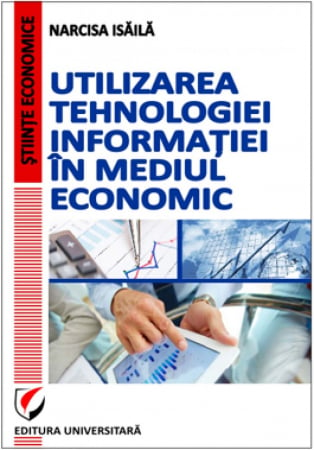ISBN: 978-606-28-0413-8
DOI: 10.5682/9786062804138
Publisher year: 2016
Pages: 168
Publisher: Editura Universitară
Author: Valentina Zaharia, Mihaela-Mirela Dogaru
- Description
- Download (1)
- Authors
- Content
- More details
- Reviews (0)
The concept of strategic management includes a general program of action and allocation of resources for the long-term achievement of major objectives.
"Strategic management includes a set of decisions and actions, materialized in the formulation and implementation of plans designed to achieve the company's objectives."
"Strategic management refers to the entire management of the company based on strategy, so it refers to the scientific management of the company, which is always based on strategy."
Strategic management must be based on high-performance strategies that study and find optimal solutions to a wide range of future goals and problems such as:
demand-supply ratio;
which services are profitable;
if the clients are offered something extra in relation to the possibilities of the competitors on the market;
if they can legally discourage competitors;
what is the most appropriate pricing policy;
employee motivation;
personnel policy;
As a principle, strategic management is an essential and exclusive attribute of the top management of the company.
The strategic management establishes and offers a vision and a general unitary framework of action at all hierarchical levels, especially at the top level, confusing all activities and inducing the responsibility of the key points in the organizational structure in carrying out the entire process.
The continuous change - determined and decisive, at the same time, of processes with global slack (globalization of the economy - of production and markets alike, managerial revolution - in turn, cause and effect of the emergence and development of the knowledge-based society, etc.) seems to be the engine that set in motion the strategic management, and which knows, together with it, reconfigurations and redefinitions of nature to ensure the adaptation - dynamic and proactive - of the organizations to the environment (internal and external) in which it operates.
These changes have an extraordinary dynamism within the companies' environment and have made the strategic management stand out as a superior form of predictive management.
-
Politici de marketing
Download
Assist. univ. PhD, Dimitrie Cantemir Christian University
VALENTINA ZAHARIA
CHAPTER I - THE CONCEPT AND THE NEED FOR STRATEGIC MANAGEMENT / 7
1.1. The concept of strategic management / 7
1.2. Strategic management features / 9
1.3 Similarities and differences between strategic management and strategic planning / 9
1.4. Advantages and limits of strategic management / 10
1.5. Attributions, competencies and responsibilities in strategic management / 11
Grid tests / 14
CHAPTER II - ANALYSIS OF THE COMPANY 'S INTERNAL ENVIRONMENT / 23
2.1. Resources needed / 24
2.2. Capabilities / 26
2.3. Value chain analysis / 30
2.4. Culture of the organization / 32
2.5. The role of leadership in strategic management / 33
2.6. Internal Evaluation Matrix (IFE) / 34
Grid tests / 38
CHAPTER III - ANALYSIS OF THE EXTERNAL ENVIRONMENT / 52
3.1. General presentation / 52
3.2. The company's macro-environment / 54
3.3. The microenvironment of the company / 62
3.4. Macro-environment analysis of the enterprise / 76
Grid tests / 80
CHAPTER IV - MARKETING POLICIES / 88
4.1. Promotional policy / 88
4.1.1. Promotional policy - Definition and structure of promotional activity / 88
4.1.2. Promotional strategies / 91
4.2. Distribution policy / 92
4.2.1. The concept of distribution / 92
4.2.2. Distribution channels and forms / 94
4.2.3. Strategies of / 95
4.2.4. Strategic variants / 96
4.2.5. Operationalization of the strategy / 98
4.3. Product policy / 102
4.3.1. Product policy, component of the marketing mix / 102
4.3.2. Product life cycle / 104
4.3.3. Product range and its dimensions / 105
4.4. Price policy / 107
4.4.1 The component price of the marketing mix / 107
4.4.2. Pricing strategies / 109
CHAPTER V - ELABORATION OF THE COMPANY STRATEGY / 115
5.1. The concept of strategy and the main characteristics / 115
5.2. Strategic vision on enterprise management / 121
5.2.1. The model of the five forces of competition / 122
5.2.2 Competitive advantage and generic strategies / 126
Grid tests / 131
CHAPTER VI - PERFORMANCE STRATEGIES / 137
6.1. SWOT / 138 analysis
6.2. Efficiency strategies / 140
6.3. Quality strategies / 142
6.4. Innovation strategies / 145
Grid tests / 146
CHAPTER VII - BUSINESS STRATEGIES / 148
7.1. Cost leader strategy / 148
7.2. Differentiation strategy / 149
7.3. Focusing strategy / 150
7.4. Investment strategy / 152
Grid tests / 153
CHAPTER VIII - COMPETITION STRATEGIES / 156
8.1. Strategies in fragmented industries / 156
8.2. Strategies in embryonic or developing industries / 158
8.3. Strategies in mature industries / 160
8.4. Strategies in declining industries / 162
Grid tests / 163
BIBLIOGRAPHY / 164
The concept of strategic management includes a general program of action and allocation of resources for the long-term achievement of major objectives.
"Strategic management includes a set of decisions and actions, materialized in the formulation and implementation of plans designed to achieve the company's objectives."
"Strategic management refers to the entire management of the company based on strategy, so it refers to the scientific management of the company, which is always based on strategy."
Strategic management must be based on high-performance strategies that study and find optimal solutions to a wide range of future goals and problems such as:
demand-supply ratio;
which services are profitable;
if the clients are offered something extra in relation to the possibilities of the competitors on the market;
if they can legally discourage competitors;
what is the most appropriate pricing policy;
employee motivation;
personnel policy;
As a principle, strategic management is an essential and exclusive attribute of the top management of the company.
The strategic management establishes and offers a vision and a general unitary framework of action at all hierarchical levels, especially at the top level, confusing all activities and inducing the responsibility of the key points in the organizational structure in carrying out the entire process.
The continuous change - determined and decisive, at the same time, of processes with global slack (globalization of the economy - of production and markets alike, managerial revolution - in turn, cause and effect of the emergence and development of the knowledge-based society, etc.) seems to be the engine that set in motion the strategic management, and which knows, together with it, reconfigurations and redefinitions of nature to ensure the adaptation - dynamic and proactive - of the organizations to the environment (internal and external) in which it operates.
These changes have an extraordinary dynamism within the companies' environment and have made the strategic management stand out as a superior form of predictive management.

6359.png)
![Marketing policy - Mihaela-Mirela Dogaru, Valentina Zaharia [1] Marketing policy - Mihaela-Mirela Dogaru, Valentina Zaharia [1]](https://gomagcdn.ro/domains/editurauniversitara.ro/files/product/large/politici-de-marketing-633-51061.jpg)














